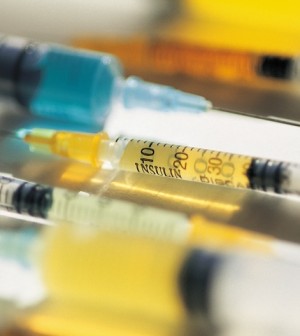- Could Your Grocery Store Meat Be Causing Recurring UTIs?
- Are You Making This Expensive Thermostat Error This Winter?
- Recognizing the Signs of Hypothyroidism
- 10 Strategies to Overcome Insomnia
- Could Artificial Sweeteners Be Aging the Brain Faster?
- Techniques for Soothing Your Nervous System
- Does the Water in Your House Smell Funny? Here’s Why
- Can a Daily Dose of Apple Cider Vinegar Actually Aid Weight Loss?
- 6 Health Beverages That Can Actually Spike Your Blood Sugar
- Treatment Options for Social Anxiety Disorder
Health Highlights: Jan. 7, 2015


Here are some of the latest health and medical news developments, compiled by the editors of HealthDay:
FDA Approves Treatment for Acne Scarring
The U.S. Food and Drug Administration has approved a new treatment for acne scarring.
Called Bellafill, the product is an injected gel that adds volume to the skin to lift and smooth out pitted acne scars to the level of the surrounding skin, the agency said.
In the study that led to FDA approval, 64 percent of 87 patients treated Bellafill said their skin had improved six months after treatment, compared with 33 percent of 46 patients treated with a placebo.
Also at six months, 84 percent of those treated with Bellafill said they were “very satisfied,” “satisfied” or “somewhat satisfied,” compared with 52 percent of those treated with a placebo.
Also at six months, doctors who didn’t know which treatment patients had received judged 84 percent of Bellafill patients “improved” or “much improved,” compared to 54 percent of placebo patients.
Bellafill, made by San Diego-based Suneva Medical Inc., costs about $1,000 per injection. The cost, like most cosmetic procedures, is not covered by insurance, according to Dr. Jeffrey Salomon, an assistant clinical professor of plastic surgery at Yale University School of Medicine.
—–
Compounding Pharmacy Owners’ Accounts Seized
More than $18 million has been seized from the owners of a compounding pharmacy linked to a 2012 meningitis outbreak that killed 64 people across the United States, federal officials say.
The funds from people connected to the New England Compounding Center in Massachusetts were seized at 13 financial institutions, U.S. Attorney Carmen Ortiz said, the Associated Press reported.
Authorities froze about $16.8 million in accounts connected to Douglas and Carla Conigliaro. She was a majority shareholder in the compounding pharmacy. Husband and wife have been charged with transferring assets following the outbreak.
Another $1.5 million was seized from accounts held by Barry Cadden, a co-founder and shareholder of the company, the AP reported. Cadden has been charged with 25 counts of second-degree murder.
The meningitis outbreak was traced to tainted steroid injections made by the New England Compounding Center.
Copyright © 2026 HealthDay. All rights reserved.










